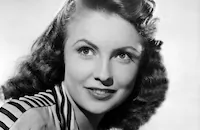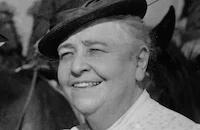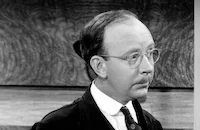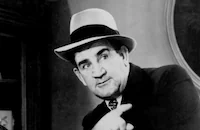Thieves Fall Out

Brief Synopsis
Cast & Crew
Ray Enright
Eddie Albert
Joan Leslie
Jane Darwell
Alan Hale
William T. Orr
Film Details
Technical Specs

Synopsis
Eddie Barnes works for his father Rodney, the owner of the Barnes Slumber Accessories Company. Eddie is in love with Mary Matthews, the daughter of Barnes's competitor, Charles Matthews, but does not earn enough money to marry her. After Rodney turns down his request for a raise, Eddie fears that Mary will be persuaded to marry successful car salesman George Formsby, the man her parents prefer. Eddie's grandmother, Emma Allen, reminds him that after his mother's death, he will inherit a legacy left to him by his grandfather and encourages him to sell the legacy in order to obtain enough money to go into business for himself. For this purpose, Eddie approaches David Tipton, who, afraid that Eddie might predecease his mother, is reluctant to buy the inheritance. Finally, he agrees to the purchase, provided that Eddie marry and start a family in the next sixty days. Eddie puts a down payment on a coil springs business, and that night, with Grandma's help, Eddie and Mary elope. Faced with the reality of the marriage, the Barneses agree to let Eddie and Mary live with them, but the Matthewses insist that if Eddie has not made good within sixty days, Mary must return home. Keeping the terms of the legacy sale in mind, Eddie waits fruitlessly for signs that Mary is pregnant. At the last minute, Grandma mistakenly believes that Mary is pregnant when she sees her making baby clothes and the sale goes through. After Eddie buys the coil springs factory, he learns that the factory's price was low because the previous owner was unable to fill a government order for truck springs without an expensive retooling job. When Eddie discovers that several other outstanding jobs were bid under cost, he decides to bill the clients at full cost and use the additional money to complete the government order. In the meantime, Tipton calls on Eddie at home to inform him that he has turned over Eddie's legacy to gangster Chick Collins. Ella, Eddie's mother, believes that Collins will now kill her in order to collect on the inheritance. Eddie also learns that Mary is not pregnant, but was making baby clothes for a friend. Then Matthews and Rodney find out that Eddie is the new owner of the coil factory. Both men are angry at Eddie for raising his bid and, believing that Eddie only married her to sell the legacy, Mary leaves him. When Collins makes veiled threats against Ella's life and offers to sell the legacy back to Eddie, Grandma hatches a plot. She pretends to have been hit by Collins' car. Mistaking Grandma for Ella, Collins puts her in his car and drives to his office, followed by Eddie and Mary, who has returned for her clothes. At the office, Grandma reveals to Collins that she is Eddie's grandmother and threatens to accuse him of kidnapping her if he does not return Eddie's legacy. Meanwhile, Eddie has learned that the government has changed its order from truck springs to bed springs and there is no longer any need to retool the factory. Now that the legacy has been returned and Eddie's success in business is assured, he and Mary are reconciled.

Director
Ray Enright
Cast

Eddie Albert

Joan Leslie

Jane Darwell

Alan Hale

William T. Orr

John Litel

Anthony Quinn

Edward Brophy

Minna Gombell
Vaughan Glaser

Nana Bryant
Edward Gargan

Hobart Cavanaugh
Frank Faylen

William Davidson
Etta Mcdaniel

Tom Kennedy
Ann Edmonds
Jack Wise
Cliff Clark
Walter Soderling
Crew
Milo Anderson
Bryan Foy
Edmund Grainger
Charles Grayson
Les Guthrie
Sig Herzig
Sid Hickox
Stanley Jones
Clarence Kolster
Ring Lardner Jr.
Gene Lewis
Ben Markson
Max Parker
Gertrude Purcell
H. Roemheld
Perc Westmore

Film Details
Technical Specs

Articles
Thieves Fall Out
Thieves Fall Out, released in 1941, was one of four movies Quinn made for Warner Bros. that year under his new contract with the studio. Of those, only one -- They Died with Their Boots On, starring Errol Flynn as General George Custer and featuring Quinn as Chief Crazy Horse -- was an "A" picture. For the most part, with Academy Awards and stardom still a decade away, Quinn plugged away in minor pictures, usually cast as an Indian warrior, a Mexican bandit or a gangster.
He plays the latter type, a mobster named Chic Collins, in Thieves Fall Out. This family comedy stars Eddie Albert as a naive man whose grandmother allows him to cash in his inheritance -- a mattress factory -- before she dies, so he can marry the girl of his dreams (Joan Leslie). Quinn and his hoods, including Frank Faylen as his bodyguard Pick, step in to buy the business. After some crooked dealings, to their eventual chagrin they end up kidnapping the feisty grandmother.
The movie is based on a play, 30 Days Hath September, which ran for 16 performances in New York in 1938, with Alison Skipworth playing the wisecracking Grandma. Jane Darwell, fresh from her Oscar®-winning triumph as Ma Joad in The Grapes of Wrath (1940), enjoys the scene-stealing role in this film version.
Thieves Fall Out was one of five movies in which Quinn appeared with Faylen. He later shared credits with Darwell in The Ox-Bow Incident (1943), with Joan Leslie in Where Do We Go from Here? (1945) and with director Ray Enright in China Sky (1945).
Producer: Bryan Foy (uncredited), Edmund Grainger (Associate Producer)
Director: Ray Enright
Screenplay: Charles Grayson, Ben Markson, Sig Herzig (uncredited), Ring Lardner, Jr. (uncredited) and Gertrude Purcell (uncredited), from play by Irving Gaumont and Jack Sobel
Cinematography: Sid Hickox
Art Direction: Max Parker
Original Music: Heinz Roemheld, Effie I. Canning (uncredited)
Editing: Clarence Kolster
Costume Design: Milo Anderson
Cast: Eddie Albert (Edward "Eddie" Barnes), Joan Leslie (Mary Matthews), Jane Darwell (Grandma Allen), Alan Hale (Robert Barnes), William T. Orr (George Formsby), Anthony Quinn (Chic Collins), Frank Faylen (Pick).
BW-72m.
by Roger Fristoe

Thieves Fall Out
Eddie Albert (1906-2005)
The son of a real estate agent, Albert was born Edward Albert Heimberger in Rock Island, Ill., on April 22, 1906. His family relocated to Minneapolis when he was still an infant. Long entralled by theatre, he studied drama at the University of Minnesota. After years of developing his acting chops in touring companies, summer stock and a stint with a Mexican circus, he signed a contract with Warner Bros. and made his film debut in Brother Rat (1938). Although hardly a stellar early film career, he made some pleasant B-pictures, playing slap happy youths in Brother Rat and a Baby (1940), and The Wagons Roll at Night (1941).
His career was interrupted for military service for World War II, and after his stint (1942-45), he came back and developed a stronger, more mature screen image: Smash-Up: The Story of a Woman (1947); Carrie (1952); his Oscar® nominated turn as the Bohemian photographer friend of Gregory Peck in Roman Holiday (1953); a charming Ali Hakim in Oklahoma (1955); and to many critics, his finest hour as an actor, when he was cast unnervingly against type as a cowardly military officer whose lack of commitment to his troops results in their deaths in Attack! (1956).
As he settled into middle-age, Albert discovered belated fame when he made the move to Hooterville. For six seasons (1965-71), television viewers loved Eddie Albert as Oliver Wendal Douglas, the bemused city slicker who, along with his charming wife Lisa (Eva Gabor), takes a chance on buying a farm in the country and dealing with all the strange characters that come along their way. Of course, I'm talking about Green Acres. If he did nothing else, Alberts proved he could be a stalwart straight man in the most inane situations, and pull it off with grace.
After the run of Green Acres, Albert found two of his best roles in the late stages of his career that once again cast him against his genial, good-natured persona: the fiercly overprotective father of Cybill Shepherd in The Heartbreak Kid (1972), for which he earned his second Oscar® nomination; and the sadistic warden in Robert Aldrich's raucous gridiron comedy The Longest Yard (1974). Soon, Albert was in demand again, and he had another hit series, playing a retired police officer who partners with a retired con artist (Robert Wagner) to form a detective agency in Switch (1975-78).
The good roles slowed down slightly by the dawn of the '80s, both film: The Concorde: Airport '79 (1979), How to Beat the High Co$t of Living (1980), Take This Job and Shove It (1981); and television: Highway to Heaven, Murder, She Wrote, Thirtysomething, offered him little in the way of expansion. Yet, Albert spent his golden years in a most admirable fashion, he became something of activist for world health and pollution issues throughout the latter stages of his life. It is widely acknowledged that International Earth Day (April 22) is honored on his birthday for his tireless work on environemental matters. Albert was married to famed hispanic actress Margo (1945-85) until her death, and is survived by his son, actor Edward Albert, a daughter, and two granddaughters.
by Michael T. Toole
Eddie Albert (1906-2005)
Quotes
Trivia
The original play opened in New York on 30 September 1938, with Alison Skipworth in the role of Grandma. It closed after 16 performances.
Notes
The film's working title was Thirty Days Hath September. A December 27, 1940 Hollywood Reporter news item reports that May Robson was reassigned from this film to Million Dollar Baby.

Miscellaneous Notes
Released in United States 1941
Released in United States 1941














